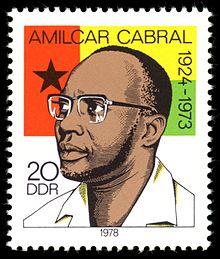- African Party for the Independence of Cape Verde
-
African Party for the Independence of Cape Verde
Partido Africano da Independência de Cabo Verde
Leader José Maria Pereira Neves Founded January 1981 Headquarters Praia, Santiago Island, Sotavento Group, Cape Verde Youth wing Youth of PAICV Ideology Social democracy,
Democratic socialismPolitical position Centre-left International affiliation Socialist International Official colours Red, Green and Yellow
National Assembly 37 / 72Website http://www.paicv.cv/ Politics of Cape Verde
Political parties
ElectionsThe African Party of Independence of Cape Verde (Portuguese: Partido Africano da Independência de Cabo Verde, PAICV) is a former socialist party and presently a social-democratic political party in Cape Verde. Its members are nicknamed “os tambarinas” in Portuguese (the tamarinds), and they identify themselves with the color yellow.
Contents
Forerunner
In 1956, its forerunner, the African Party for the Independence of Guinea and Cape Verde (PAIGC), was founded by the Cape Verdean nationalist leader Amílcar Cabral. PAIGC fought to overthrow the Portuguese Empire, unify Cape Verde and Guinea-Bissau, and of use its vanguardism to advance socialist revolution.
From 1961 on, the PAIGC fought a guerrilla warfare campaign in cooperation with its fraternal party umbrella group, the CONCP, during the Portuguese Colonial War. By 1973 the PAIGC controlled Guinea-Bissau, while Portugal's own Carnation Revolution in 1974 effectively dissolved the empire, relinquishing Cape Verde within the next year.
After the wars of national liberation, the PAIGC established a socialist state within both territories under the late Amilcar Cabral's brother, Luís Cabral.
PAICV Established
Following a military coup in Guinea-Bissau that ousted Cabral in November 1980, the Cape Verde portion of the party became the PAICV in January 1981; it was headed by the President of Cape Verde, Aristides Pereira.[1]
Multiparty Democracy
At an extraordinary party congress in February 1990, the PAICV approved the introduction of multiparty democracy. Pereira stepped down as General Secretary of PAICV in July 1990, and Prime Minister Pedro Pires replaced him in August 1990. The PAICV won 23 of the 79 National Assembly seats in the January 1991 multiparty parliamentary election, losing to the Movement for Democracy (MpD). Pereira was subsequently defeated in the February 1991 presidential election, and PAICV again fared poorly in the December 1991 local elections. At a party congress in August 1993, Pires was replaced as General Secretary by Aristides Lima and was instead elected as President of PAICV.[1]
The PAICV won 21 out of 72 National Assembly seats in the December 1995 parliamentary election.[1] At a PAICV congress in September 1997, Pires faced José Maria Neves in a leadership contest,[2] and Pires was elected with 68% of the vote.[3] Pires stepped down as PAICV President in 2000 in preparation for a presidential bid in the next year's election[4] and he was succeeded by Neves.[1]
2001 Election
In the presidential election held on 11 and 25 February 2001, PAICV candidate Pedro Pires, who won 46.52% of the vote in the first round, narrowly defeated the MpD's Carlos Veiga by a margin of only 12 votes in the run-off.
2006 Election
In the parliamentary election held on 22 January 2006, PAICV won 52.28% of the popular vote and 41 out of 72 seats in the National Assembly.
In the presidential election held on 12 February 2006, Pedro Pires again defeated Carlos Veiga, winning 50.98% of the vote.
Focus and Affiliation
The PAICV, which advertises itself as an Africa-oriented political party in contrast to the somewhat neoliberal MpD, enjoys its greatest support in the municipalities most comparable to those on the African mainland: the dense urban areas such as Praia, and rural agricultural areas such as Santa Cruz and São Filipe.
The party is a full member of the Socialist International.[1][5]
References
- ^ a b c d e Political Parties of the World (6th edition, 2005), ed. Bogdan Szajkowski, page 113.
- ^ "Cape Verde: Opposition party congress opens", Radio Renascenca, Lisbon (nl.newsbank.com), September 19, 1997.
- ^ "Cape Verde: Former PM elected leader of main opposition PAICV party", Radio Renascenca, Lisbon (nl.newsbank.com), September 22, 1997.
- ^ "Cape Verde: Town council leader to run for PAIGC party leadership", RDP Africa web site (nl.newsbank.com), May 29, 2000.
- ^ List of member parties of the Socialist International in Africa.
External links
Political parties in Cape Verde 
African Party for the Independence of Cape Verde - Democratic and Independent Cape Verdean Union - Democratic Convergence Party - Democratic Renewal Party - Labour and Solidarity Party - Movement for Democracy - Social Democratic Party Categories:- Political parties established in 1981
- Political parties in Cape Verde
- Parties of single-party systems
- Social democratic parties
- Socialist International
Wikimedia Foundation. 2010.

